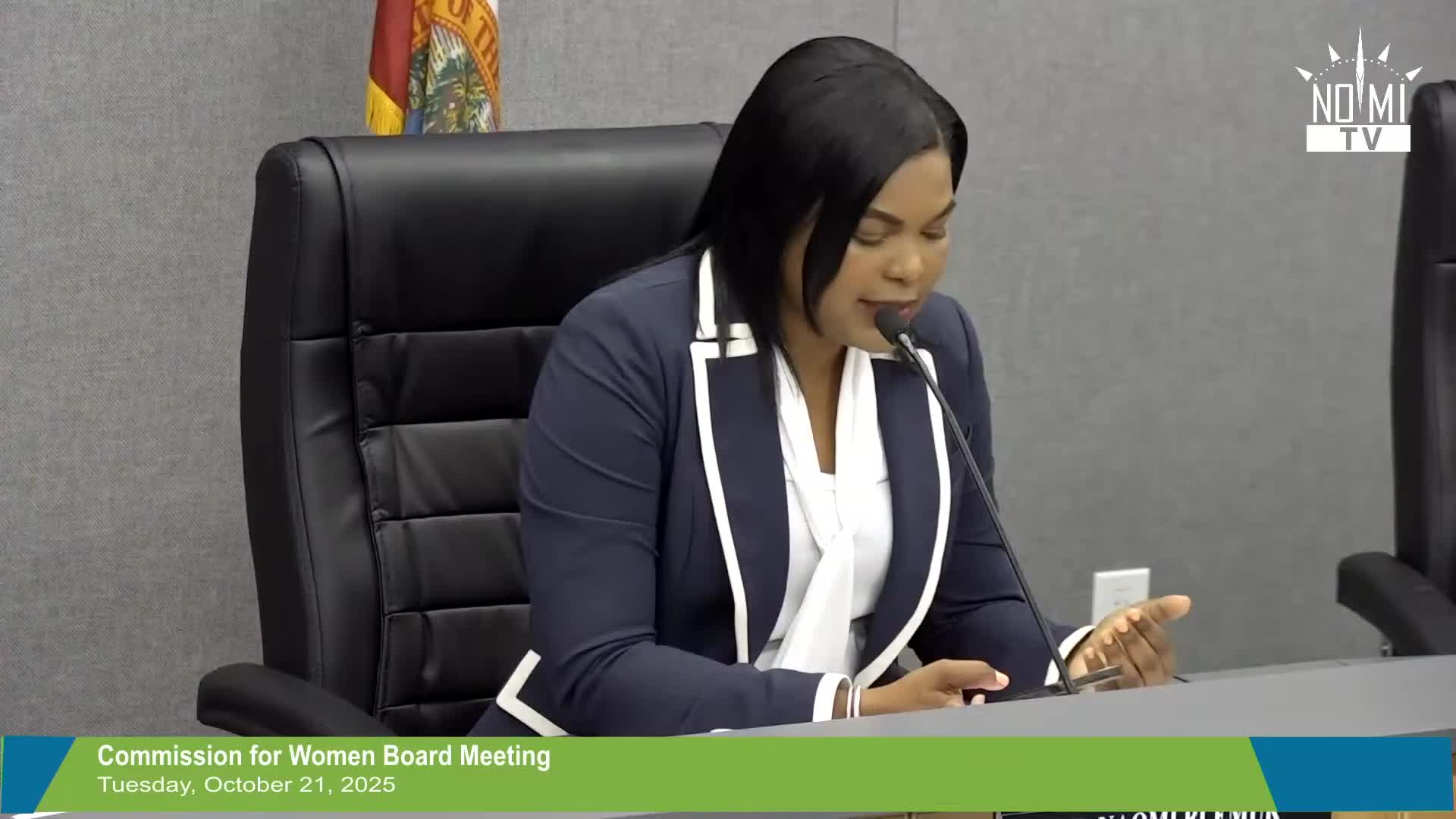North Miami panel cites housing, health and violence as top threats to women; commission votes to host countywide summit
Get AI-powered insights, summaries, and transcripts
Subscribe
Summary
The North Miami Commission for Women heard a data-driven overview of the status of women and girls in Florida and approved a proposal to host an annual Miami‑Dade Women’s Leadership Summit.
The North Miami Commission for Women heard a data-driven overview of the status of women and girls in Florida and approved a proposal to host an annual Miami‑Dade Women’s Leadership Summit.
Dr. Rosario Concha, research associate at the University of Miami School of Law’s Human Rights Clinic, summarized results from the Florida Commission on the Status of Women survey and local studies that she said show three recurring concerns for women: economic security, health care and violence. "Black women are 4 times more likely to die in delivery related complications than white women," Dr. Concha said, citing maternal‑mortality rates and racial disparities.
The presentation placed the statewide findings in a Miami‑Dade context: the federal poverty rate for women in Florida is cited at about 13.6 percent (higher in Miami‑Dade at about 16.3 percent); median wages for female‑dominated jobs and local rents create affordability gaps; and preliminary Miami‑Dade Safety Project figures show elevated maternal mortality and significant demand for emergency housing and survivor services. Francesco Duberly, founder and CEO of Survivors Pathway, told the commission his organization served about 4,500 victims of crime in 2024 and that 85 percent of those clients were women.
Why it matters: Commissioners and community partners said the data link economic insecurity and housing instability to intimate‑partner violence, human trafficking and worse health outcomes, especially for Black and Latina women in Miami‑Dade. The commission moved to translate the information into countywide coordination and policy advice.
Key findings presented and discussed - Economic security and housing: Dr. Concha summarized the Florida survey finding that 55 percent of respondents cited financial stability as a top concern. She noted that many female‑dominated occupations (home health aides, house cleaners, school teachers) do not earn wages sufficient to meet local rent levels; using Miami examples, she showed that some workers would need to spend more than half their income on a two‑bedroom unit. - Health care and maternal mortality: Dr. Concha reported a statewide maternal mortality rate of roughly 21 deaths per 100,000 live births and described racial disparities: non‑Hispanic Black women experienced substantially higher rates than non‑Hispanic white women. She said Miami‑Dade’s 2023 maternal mortality rate was about 20.3 per 100,000 overall and about 61.6 per 100,000 for Black women. "This puts the United States in the lowest rank of developed countries," she said. - Violence and service demand: Dr. Concha and Survivors Pathway emphasized links among housing instability, intimate‑partner violence (IPV), human trafficking and HIV. Mr. Duberly said Survivors Pathway invested about $6,000,000 in services through 2025 and that in 2024 the organization served more than 1,000 women victims of domestic violence.
Community partners and next steps Representatives from the Florida Commission on the Status of Women (including Commissioners Candace Vasilian and Belinda Kaiser), the Miami‑Dade Commission for Women (Chair Michelle Abreu), Survivors Pathway, Global Innovative Foundation and other local nonprofit and business leaders addressed the meeting and described available programs such as emergency housing, legal advocacy, health clinics and workforce supports. Several speakers urged better data disaggregation by race and local partnerships with universities for targeted research.
Formal action: annual summit approved The commission voted to approve a proposal to host an annual Miami‑Dade Women’s Leadership Summit, with a proposed timeline beginning in 2026. The motion to approve the summit was made and seconded on the floor and passed by voice/roll call. Roll call recorded approvals from commissioners present, and the chair declared the motion passed.
What the commission asked staff to do next Commissioners directed staff to move the proposal forward to the city’s administrative process for scheduling and partner coordination; they asked for a follow‑up report with a proposed budget, partners and a summit timeline. Commissioner Marie Etienne told the meeting she will present a complementary women’s health equity and prevention proposal at a future meeting that will include budget details.
Taper: the meeting closed with offers of continued partnership from local organizations and a pledge from commissioners to follow up on policy, research and service coordination to address the issues raised.
